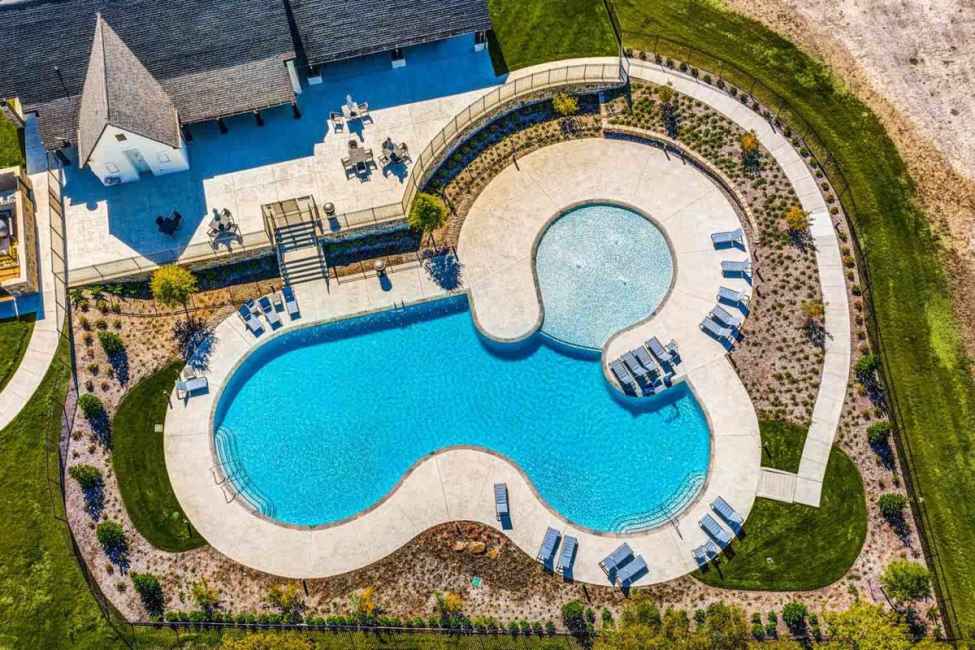
The Saltwater vs. Chlorine debate has left pool owners puzzled since saltwater alternatives hit the market around 30 years ago, offering new options to traditional chlorine pools. Whether you’re embarking on your first installation or considering switching up your water sanitation hygiene, it’s important to weigh the pros and cons of both options to find the method most suitable for you and your family. Our pool experts will help you solve the question you undoubtedly have to ask yourself at some point when building a pool: saltwater vs. chlorine, which option is right for me?
The Traditional Chlorine Pool
The chlorinated pool has been the longest-serving water system on the market for private and commercial use, offering an effective method for disinfecting and maintaining the overall cleanliness of your pool. Working alongside your pumping system, chlorine provides protection against harmful bacteria and algae that burden most owners, playing a crucial part in your water’s cleaning regime.
Easy Maintenance, Low Running Costs
Requiring only a large body of water, cleaning equipment, and a pumping system, chlorinated pools are often regarded as the easiest to maintain for backyard pool owners, providing accessibility to newbies and those looking for simpler set-ups. From initial installation to general running costs, chlorine supersedes the expensive saltwater alternative, with low installation fees, electricity-efficient pumping systems, and an abundance of parts and repairs on offer in a well-stocked market. Owners need to maintain adequate pH levels and apply caution when adding chlorine levels for correct ratios. Testing strips are widely available in the market for pool owners for monitoring chemical levels to ensure safety.
Disadvantages of Chlorine Pools
When used appropriately with manufacturing and product guidelines, chlorinated pools offer owners a welcoming environment for taking a dip. Yet under the surface, the risk of health effects starts to bubble when faced with improper use. Side effects from exposure to chlorine often result in minor skin burns or irritation, easily treatable with home remedies or over-the-counter medicines. Although these instances are easily avoided by using the correct practices for chlorine treatment methods, they can be enough to sway many homeowners to consider swimming in different waters.
Introducing the Saltwater pool
Hitting the market around 30 years ago, Saltwater pools offered the happy medium of health and efficiency that homeowners had long searched for. Ditching chlorine tablets and the puzzling ratio of chemical input vs gallons of water, this new alternative has been growing in popularity as a desirable option to the backyard pool.
A Different Water Sanitation Process
Saltwater pools offer similar results in sanitation with a reduced risk of chlorine exposure and unpleasant side effects. Using a conversion process called electrolysis, your pool’s generator creates chlorine (rather than you adding it in), achieving desired sanitation levels whilst expelling fewer chloramines into the water. Boxes of pool salt can last over an entire Texas summer, meaning you can spend less time in the stores and more time soaking in your backyard oasis.
The Health Benefits of Saltwater Pools
Swimming has many benefits for the human body, and plunging into saltwater only increases all the goodness that taking a dip can bring. Pool owners can enjoy reduced stress levels, relief from joint and muscle pain, and improvement in symptoms for chronic conditions when switching to a saltwater cleaning system. For those with allergies, asthma, or respiratory issues, this type of pool offers respite from symptoms associated with traditional chlorine sanitizing methods. In some instances, it even encourages healthy breathing through a reduction in mucus.
Disadvantages of Saltwater Pools
While offering multiple health benefits to its chlorinated counterpart, saltwater pools come with more expense during installation as well as the potential for more ongoing repairs and maintenance. The complex generator system requires specialized expertise for set-up and dealing with faults, possibly resulting in higher costs than the simpler, well-known chlorine pumping systems. If you switch from chlorine to a saltwater system, you may consider purchasing equipment specific for saltwater pools that can handle the corrosion and damage from long-term exposure. This includes lighting and heating as well as other pool features.
Choose Gold Medal Pools For Your Next Installation
Both saltwater and chlorinated pools are effective methods of sanitization for your backyard oasis. In the long run, the two options offer a similar expense for customers when accounting for repairs, maintenance, and purchasing of products. The decision of which pool is best suited for you comes down to individual choice and the practicality of your lifestyle and pool use. For example, those who prefer a simpler set-up for ease with running may opt for a chlorination pool. In contrast, someone suffering from allergies may find a saltwater system more accommodating to their symptoms.
Gold Medal Pools has the experience and knowledge to bring your dream pool to life if you’re considering switching water systems or building your pool from scratch. We are based in Lewisville and Frisco, Texas, and provide pool and backyard services to the greater North Texas area. Our professional pool builders are equipped with saltwater expertise and the traditional chlorination methods and can answer all of your saltwater vs. chlorine questions. Let’s get you started on your renovations or new pool build today. Get in touch!





